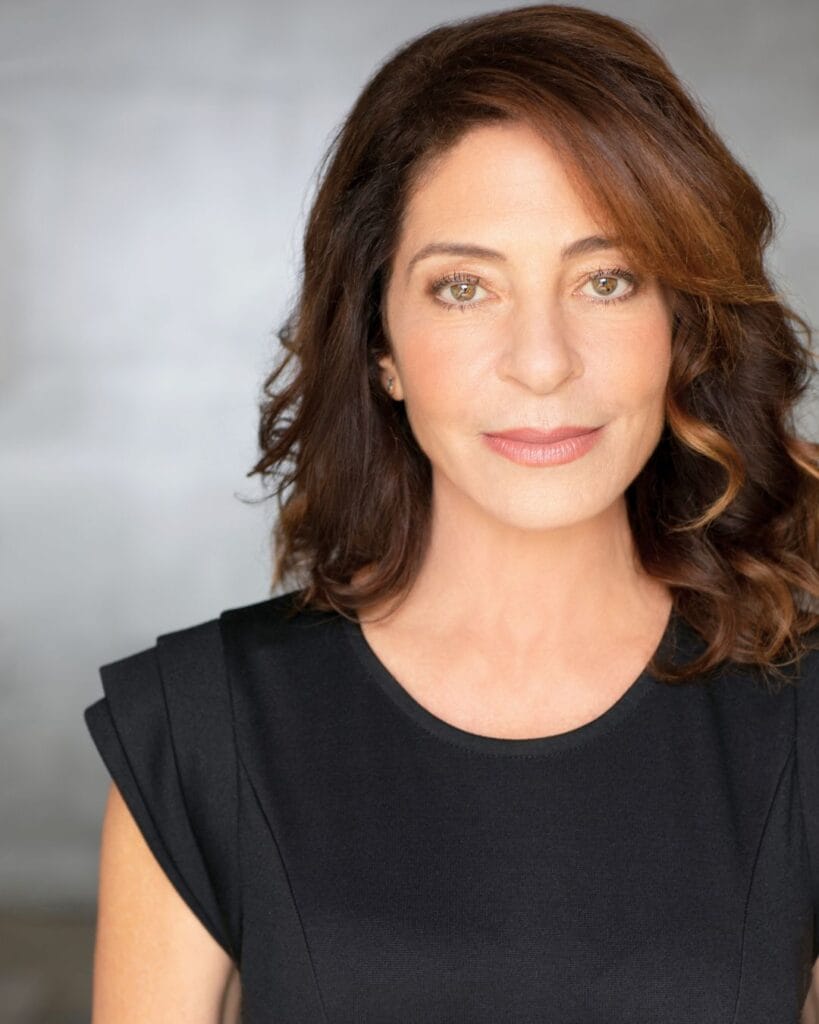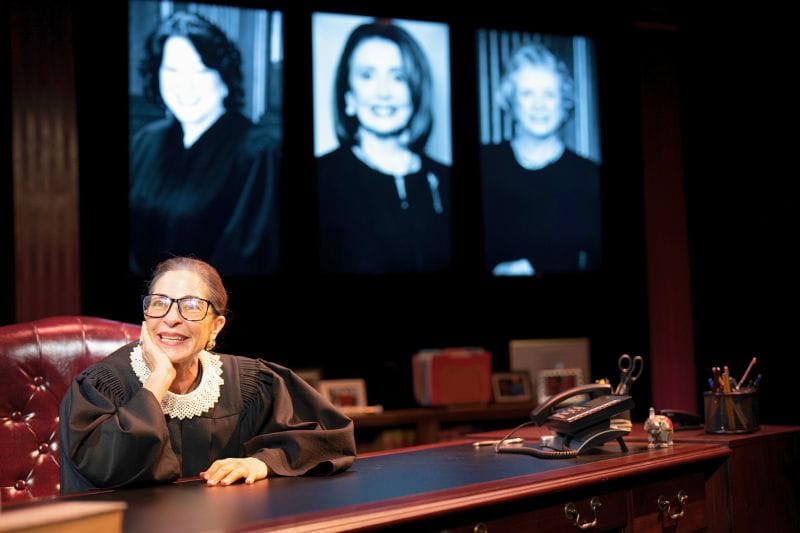“Some of my favorite opinions are dissenting opinions…You can’t have it all, all at once,” Ruth
Bader Ginsburg
Ruth Bader Ginsberg has always been a lightning rod for controversy, but one thing is undeniable: she was never boring. Never afraid to engage in tough conversations, Ginsburg enjoyed civil discourse, with an emphasis on “civil.”
In honor of Women’s History Month, Dr. Phillips Center is presenting, “All Things Equal–The Life and Trials of Ruth Bader Ginsburg,” playing Saturday, March 23 at Steinmetz Hall. The production, which has enjoyed a lot of industry buzz, is an intimate portrayal of Supreme Court Justice Ruth Bader Ginsburg, a true American original.
Multiple Tony Award-winning playwright Rupert Holmes wrote the lauded play, which had a highly successful world premiere tour last season, and stars acclaimed actress Michelle Azar. Running just over 90 fascinating and often funny minutes, the play gives us insight into one of the most polarizing yet fascinating figures, a true American original.

Michelle Azar, the award-winning actress who has taken on the herculean task of channeling Ginsburg, sat down with me on assignment for Orlando Date Night Guide to discuss what intrigued her about this project, her intensive preparation for the role, and why her story continues to resonate so strongly with the public.
Related post: Tips for an Unforgettable Night at Dr. Phillips Center
Interview with Michelle Azar, award-winning actress
ODNG: What makes Ruth Bader Ginsburg such an iconic figure? Five years after her death, we’re still grappling with her legacy.
Azar: I think it’s her tenacity, which I love. Ruth not only said it’s about women having a place at the table. She said, “Women belong in all places where decisions are being made.” I love that line. But she went ahead further and said, “Let’s craft this to show why equality matters so much. If we can realize that men also do better when everybody does better.”
ODNG: It was an ingenious approach to show the lack of equality for women by defending a man’s right in order to shine a spotlight on this inequality.
Azar: Wasn’t she brilliant?
ODNG: We don’t see Sandra Day O’Connor impressions on SNL. Yet, Ginsburg has captured our imagination, continuing to fascinate us to this day.

Azar: Yes, O’Connor also saw herself as equal to men, but she wasn’t interested in rewriting precedent, where O’Connor says Ruth was interested in rewriting precedent. But Ruth says, “No, I’m not.” She was interested because the 14th amendment says we’re all created equal. Now, let’s really put our money where our mouth is and test that to make sure all the laws we are living by are true to this. It’s why we’re still writing about her and doing SNL skits. It’s why she’s so much in the zeitgeist.
ODNG: How do you think she felt about her celebrity public persona?
Azar: She was a character; there’s no doubt about that. She loved pivoting. When asked if the gossip and notoriety annoyed her, she said, “Absolutely not! Isn’t it wonderful that I’m 87 years old and everybody wants to take a picture with me? Isn’t that remarkable?”
ODNG: She certainly didn’t shy away from controversy.
Azar: Ruth was scrappy. She grew up with nothing, in the backdrop of World War Two, Jewish, seeing so much loss. Ruth identified so intrinsically with Anne Frank and was aware of the questions they were both asking about the age they were living in. She was very aware of the fact that both her parents were new to this country. That was a big deal.
Her mom died right there while she was in high school. She was grappling with these issues, like, “Okay, I’m a woman with a mind. My sister died when I was 14 months old. My mom died when I was 17. It’s either doing this thing or not at all.”
I think it was her scrappiness, if you will, to make something out of nothing each time that set her apart.
ODNG: That’s fascinating insight, Michelle. It seems in this role you are part actor, part psychological historian. Would you share how you prepared for this role?
Azar: It was quite a painstaking process. Sitting with 90 minutes of text, saying things I’ve never said before. Rarely had I uttered or thought about the Supreme Court, so it hit me up from all fronts.
But the first way I started was externally. I’m quite the emotional actor and I usually go from the inside out. But when it’s somebody who’s out there in the world like Ruth, you’ve got to show up and do your homework. So I just listened and listened and listened and tried to figure out her physicality.
ODNG: Speaking of physicality, was your background in dance and yoga helpful as you prepared for this role?
Azar: Absolutely, as a dancer and yoga teacher, I love movement. So questions like what age did her neck start doing that thing we see in most of the photos, thinking about her process of chemo and decline; these things became very important to me. How she would walk, what’s the impetus, where is she hurting and where is she holding this hurt in her body? I was very interested in the physicality of it.
And then there’s the voice. She has a little bit of a lisp in her later years and she’s left-handed. As I learned the script, this physicality was easier to facilitate. I was always learning something new, and I still am. I think that’s why playing her is such a gift.
ODNG: And were you able to interview people who knew her?
Azar: Yes, I talked to as many people as I could who either knew her or knew people who knew her. Everybody was so generous in their stories, and I got really lucky. I spoke to her daughter and her rabbi.
When we were in Delray Beach, her sister-in-law, on Marty’s side of the family, they lived there, and we talked, and we spent time together. They were so appreciative. And in DC, so many people, including Nina Totenberg, everybody showed up and cared about celebrating her this way. It was really remarkable.
ODNG: Did you find some common ground with Ruth through this process?

Azar: I’ve never thought of myself as someone with a strong political voice, but socially, I’ve always been aware. Ruth’s mom would take her to the orphanage in Brooklyn on Ruth’s birthday so that the orphans could share in her cake and ice cream.
This was the moment I realized that I’ve actually been prepping my whole life to play this role. I grew up in a kibbutz-like commune that emphasized meeting others’ needs and being of service. I think that was the backbone of Ruth, to be in service so that other people’s lives are just a little bit better.
ODNG: Other than spending an enjoyable evening with Ruth Bader Ginsburg, what’s the takeaway of this production?
Azar: That every single one of us can do our part to stand up against something you don’t agree with and that the conversations now are more important than ever between differing opinions, differing views. But we’ve got to do it with civility.
The last line is, “Whenever you see things that common sense tells you are unfair or uncaring, you have every right to say I dissent.”
It’s not about sitting in some encampment, not letting some students get to class or throwing rockets or online hateful speech. I mean, do it in a way that we can listen with real ears and look each other in the eye and have conversations.
The play is about civility. The play is about looking toward dignified conversations with people with whom you disagree.
ODNG: That brings to mind Ginsburg’s relationship with Scalia.
Azar: Exactly.
ODNG: Justice Scalia, when asked about his friendship with Ginsburg, famously said, “I attack ideas. I don’t attack people. Some very good people have some very bad ideas. And if you can’t separate the two, you got to get another day job.”
It’s important to note that Scalia was a conservative Catholic, and Ginsburg was a liberal Jew. They could put their differences aside, became opera buddies and were so close their families spent New Year’s Eve together.
Azar: Rupert Holmes was really smart in how he crafted this play. This is a show for everybody and for all ages. There are 10-year-olds who have seen it, and they loved it. It’s funny and people feel like there’s a musicality to it, and not just one person on stage for 90 minutes. It feels alive and lively.
I would love anyone to come and tell me what you think after the show. I want to hear from people, so I welcome audience members to come talk to me afterwards. And hearing from young people is something I love. I’m here for the conversation.
ODNG: That’s fantastic, Michelle. Engaging in the conversation is exactly what Ruth would have wanted.
Dr. Phillips Center Presents
All Things Equal: The Life & Trials of Ruth Bader Ginsburg
March 23, 2025 | Steinmetz Hall | 7:30 p.m.
445 South Magnolia Avenue
Orlando, FL 32801
407.358.6603
Tickets from: $35.50
More info: drphillipscenter.org
Featured image by Thee Photo Ninja

